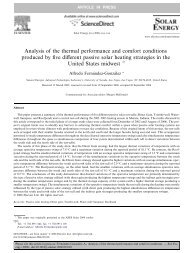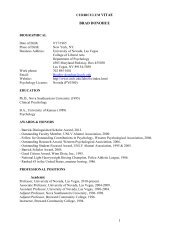2013 Conference Proceedings - University of Nevada, Las Vegas
2013 Conference Proceedings - University of Nevada, Las Vegas
2013 Conference Proceedings - University of Nevada, Las Vegas
- No tags were found...
Create successful ePaper yourself
Turn your PDF publications into a flip-book with our unique Google optimized e-Paper software.
TOWARD IMPROVING MYMATHLABCong-Cong XingNicholls State <strong>University</strong>cong-cong.xing@nicholls.eduDesLey PlaisanceNicholls State <strong>University</strong>desley.plaisance@nicholls.eduWhile MyMathLab (MML) has achieved notable success in general mathematics education, ithas some fundamental and pedagogical issues that need to be addressed. In this paper, we (1)identify some MML-associated problems that commonly exist in lower-level college mathematicsteaching and learning; (2) propose our solution to these problems; (3) demonstrate the solutionby examples; and (4) summarize the contribution <strong>of</strong> this paper. We hope to see an improvedMML in the near future.MyMathLab (MML) is one <strong>of</strong> the cutting-edge computer-enhanced teaching and learningtools administrated by Pearson Education (<strong>2013</strong>) where students can practice their mathematicsproblem solving skills with respect to selected textbooks. It has been widely integrated intolower-level mathematics courses in colleges and universities with some success, as indicated forexample in Dries (2012), Livesay (2011), Spence (2007), Rouse (2011), Instructional Media &Magic (<strong>2013</strong>), and Anderson (2012). However, like many other technological education tools,MML is still in a young state in terms <strong>of</strong> maturity and needs to be improved, strengthened, andfurther developed.In this short paper, based on our pr<strong>of</strong>essional experiences, we point out two problems thatstudents commonly suffer in dealing with lower-level college mathematics materials. One <strong>of</strong> theproblems is particularly due to MML and is causing MML’s mishandling on checking the logicalcorrectness and validity <strong>of</strong> student work; the other problem refers to the basic understanding orstructure <strong>of</strong> algebraic expressions which is fundamental to all kinds <strong>of</strong> mathematical work. Wepropose MML-based pedagogical solutions to both problems.The rest <strong>of</strong> the paper is organized as follows: section 2 describes the problematic issues;section 3 provides a proposal for resolving the issues; section 4 gives some illustrating examples;section 5 <strong>of</strong>fers the related literature and theoretical framework; and section 6 concludes thepaper.The IssuesWe address two issues that we have noticed throughout the years <strong>of</strong> teaching. All examplesshown in this section are samples <strong>of</strong> authentic student work collected by the authors in teaching a<strong>Proceedings</strong> <strong>of</strong> the 40 th Annual Meeting <strong>of</strong> the Research Council on Mathematics Learning <strong>2013</strong> 133




